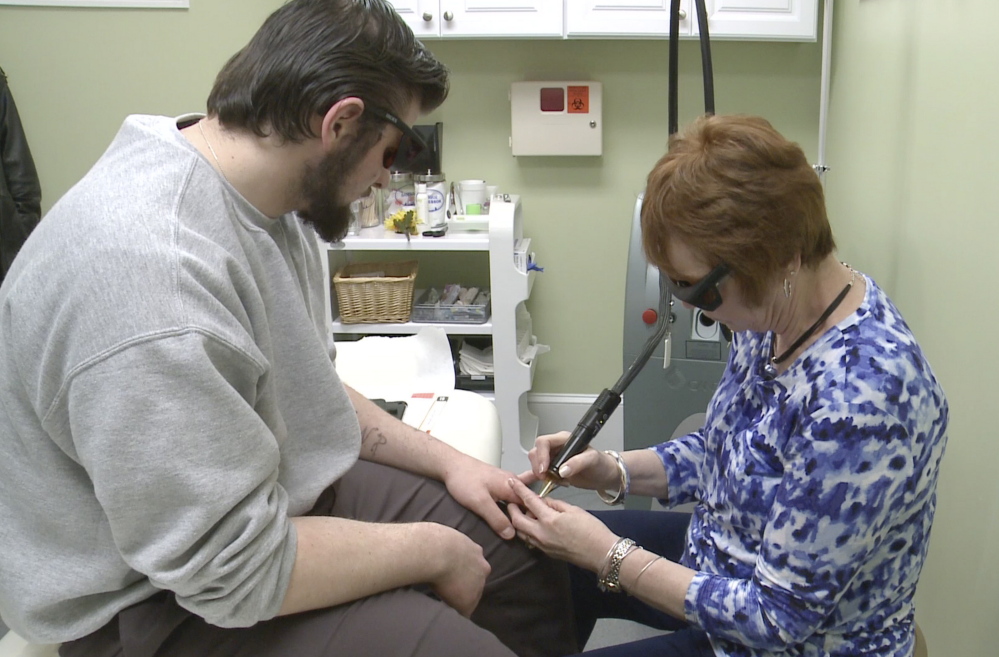Damien Clinton, 20, sits on an exam table at the Cosmetic Enhancement Center of New England in Portland wearing oversized dark glasses and a gray sweatshirt. His legs, chained together at the ankles, dangle over the side.
A corrections officer and a social worker from the Long Creek Youth Development Center, a South Portland facility for juvenile offenders where Clinton is a resident, stand against the wall.
“If you need a break at any time just let me know,” says nurse Nonie Letellier, who also wears dark glasses to deflect the bright red beam of the laser she’s using to remove a tattoo on the knuckles of Clinton’s left hand.
The tattoo, which says “hope” in faded blue letters, was scored into his skin when he was 13 by a friend using a needle and some ink.
On his left arm are two other tattoos – three initials and a makeshift cross with the words “pray for me with one eye open” circling it.
“When I (got) my tattoos it was a pretty depressing part of my life,” Clinton says. “I didn’t have much there for me … so when I look at my tattoos they remind me of that moment in time and how badly my life was going.”
All of his tattoos are homemade. All, soon to be history.
Clinton is among dozens of Long Creek residents who have had tattoos removed from their necks, faces, hands and arms by Dr. Maria Atkins and her staff at the Cosmetic Enhancement Center. Atkins has offered the procedure to juvenile offenders at no cost or very low cost for the past eight years.
“I think it’s always nice to offer things to the community that you have a specialty in,” she says. “It’s nice to give money, but when you can give something like this that they can’t get anywhere else it’s even better.”
Atkins says the young people she sees from Long Creek are “really appreciative” to be rid of the tattoos – many of them gang- and drug-related symbols or offensive words – that they’ve come to regret.
“They (get their tattoos) in times of turmoil and trauma,” she says, “and not when they’re really thinking about the consequences of putting a tattoo on their hands.”
Those consequences are especially challenging when it comes to employment and housing, says Stephanie Netto, the chief of volunteer services at Long Creek.
“A lot of the work we do with our kids focuses on jobs and supporting yourself,” Netto says. “If you’ve got kids going out looking for jobs and they have tattoos all over their neck, right or wrong, people are going to judge them.”
The same way many Long Creek residents already judge themselves.
“One of our biggest jobs is convincing our kids that they are worth more and they can achieve things in life,” Netto says. “A lot of them don’t feel like they deserve a second chance.”
Clinton, who grew up in Anson, says that’s how he used to feel. He was in and out of trouble as a teenager and ended up at Long Creek last year.
“It’s not really necessarily good that I’m in a youth facility,” he says, “but for me it is kind of good because I’m getting help. I’m getting what I need.”
And getting rid of the tattoos he no longer wants.
“I don’t want to be judged,” he says. “A lot of people, when you have tattoos, they just think, ‘Well, he’s in a gang, he’s a criminal, he’s a bad person.’ ”
As the nurse traces the ink impression on Clinton’s hand with the laser, the blue turns a dusty white. The beam shatters the ink underneath the skin, breaking it into small pieces that the body filters away. It’s a painful procedure, but Clinton barely flinches.
He says he’s just grateful to be able to see his tattoos fading fast – and his future opening up.
“My hopes are to get a job, go to college and get a career. Start my life out fresh without getting in trouble.”
Send questions/comments to the editors.



Comments are no longer available on this story